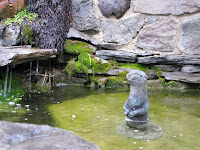
Oh yes, months and months since I've written here, I know. Lots going on, and I've drawn back into myself a bit through the summer and fall. But here we are, on a cool and sunny and glorious early November afternoon; I'm listening to Conor Oberst (doing what always sounds to me like his best Bob Dylan impression) on his latest CD, and I thought I'd use my extra hour to at least get something down.
Daylight savings time always delights me, reminding me as it does that time as we experience it is just as much something generally agreed upon as it is any objectively existent reality.
Drew and I had a walk this morning, and a good conversation about different approaches to faith--particularly Christianity. We both tend to feel drawn to and focused on the social justice aspects of Christianity, more than the particularities of individual salvation (if that makes any sense as a necessarily overly simplistic and messy distinction). Thinking a in a bit more integrative vein this morning, I was wrestling with the idea that our goal is to have our will and God's will be one and the same. I do subscribe to that goal, in the sense that I think when we are truly compassionate and connected and open to creation, we don't want anything for ourselves that isn't also good for others. But I often feel that some Christian approaches (and probably other traditions, as well, that I'm not as familiar with) begin from the premise that we are naturally sinful and willful and selfish, and we must become broken and empty so God (or Christ, depending on your orientation) can fill us with this new being--so we can be born again. Myself, I tend to believe that actually we humans are naturally good, compassionate, and made in God's image, and that we must work to connect and live in harmony with this true self. Which in practice doesn't necessarily actually look totally different, but I think sometimes the attitude of it can be extremely different.
Do we start from the premise that we are flawed, and so must be broken and remade, or do we start from the premise that we are naturally good and must unlearn or transcend or work through the attitudes and behaviors that keep us distant from our true selves (like materialism, prejudice, envy, etc.)? I've seen on tee shirts and bumper stickers the saying: "Born right the first time." And while I don't support the condescending connotation that has (nor do I generally support the idea of proclaiming huge, complicated value-based ideas on tee shirts and bumper stickers, which in my experience are not great tools for promoting respectful dialogue...but that's another issue), there's something about that sentiment, if spoken in a spirit of love, that resonates with me.
Not sure if that makes sense, exactly, but it's what's in my head at the moment. I think maybe I'm particularly engaged with some of this right now as I contemplate the little being that is developing inside me as I am about halfway through my first pregnancy. I wonder...Where did she come from? What is her nature? How does she experience existence with no language, no images, no experience of the outside world? There's a whole host of existential, biological, spiritual questions. And practical questions: What are we going to teach her? What kind of life are we going to give her?
On a lighter note, I've been thinking that maybe it would be a great childhood traveling around with your parents in a mini-camper, having no money and visiting friends and playing guitar and taking photographs all around the country. It's funny that just as I'm entering into what is somewhat clearly a phase of my life that has an entirely different level of responsibility and a new need for safety and security, I am also really reexamining the side of myself that deeply values and is oriented toward freedom (and, on a concrete level, travel). It's an exciting time to contemplate alternate lives, whether we really end up exploring them or not. In the meantime, we're beginning to plan and recruit family and friends to help with what will need to be hasty house renovations this spring back at Beaver Creek. Truth is--I admit--I love the flux, the potential, the undecided nature of it all as the next great adventure begins.









